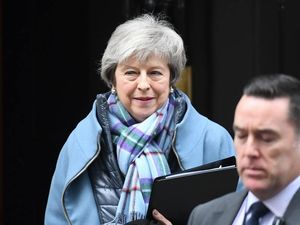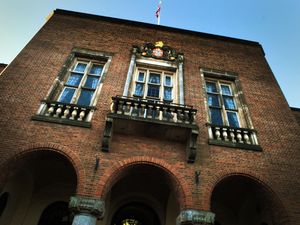May urged to reach across the political divide on Brexit
The Business Secretary says the Prime Minister needs a deal for leaving the EU which can command a ‘substantial’ Commons majority.

Business Secretary Greg Clark has urged Theresa May to reach out across the political divide to secure a Brexit deal that can command a “substantial” Commons majority.
Mr Clark – who strongly opposes a no-deal break – suggested ministers should be prepared to a listen to calls for a customs union with the EU, even though it runs counter to Government policy.
Amid reports that a swathe of ministers could resign in the event of no-deal, he said he would do “everything that I can” to prevent a “disorderly” withdrawal from the EU.
Meanwhile, the Institute for Government (IFG) said the UK is unprepared for a no-deal exit as it warned there would be “extremely damaging” disruption.
The think tank predicted that in eight out of 11 broad policy areas, including health and borders, the Government would be unable to avoid some “major negative impacts”.
IFG director Bronwen Maddox told the BBC: “The UK is not ready for no-deal.
“The disruption from no-deal – simply from the lack of preparation – would be extremely damaging. It cannot be dismissed as a mere blip.”

Mr Clark’s call came after Mrs May’s announcement that she intends to return to Brussels to re-open negotiations on the controversial Northern Ireland backstop was met with a firm rebuff from European leaders.
In a telephone call on Wednesday evening, Irish Premier Leo Varadkar told her recent events only underlined the need for a backstop that was “legally robust and workable in practice”.
The Prime Minister also spoke to European Council president Donald Tusk in what was described as an “open and frank” conversation, according to reports from Brussels.
Afterwards, he tweeted: “The EU position is clear and consistent. The Withdrawal Agreement is not open for renegotiation.”
Mrs May’s strategy secured a rare show of unity from the warring wings of the Conservative Party – as well as her allies in the DUP – in the Commons on Tuesday.
However, Mr Clark suggested she needed to find an agreement that could command broader support across the House if it was to survive.
“Not only do I think it is necessary for people to come together across partisan lines, if we are properly to move forward I don’t think we should aim for this deal to pass by a majority of one or two. I would like to a substantial majority for a deal,” he told ITV’s Peston programme.
While the Government remained committed to securing an independent trade policy, he said it was right to listen to other views – including calls for a customs union.
“I think it is reasonable going into discussions to listen to people’s views and to see where the majority is in the House of Commons – and for a substantial majority.
“I would want to see what proposals are there. I have always thought when you have a 52-48 result in the referendum you have to have a deal that respects the fact that it was close, tries to bring the country together.”
Any such move towards a “softer” Brexit would infuriate the Brexiteer wing of the Conservatives, who have warned that it would split the party.
Mr Clark however poured cold water on a compromise plan by Leave and Remain Tories to replace the backstop – intended to ensure there is no return of a hard border on the island of Ireland – with a loose free trade agreement, backed by technological “facilitations”.
“I don’t see that currently being available. I can’t see that those technical possibilities are there yet,” he said.
His comments came after Mrs May met privately with Labour leader Jeremy Corbyn – who does support a customs union – to discuss the way forward on Brexit.
In a further attempt to build cross-party support, Mr Clark – who has been holding talks with union leaders – suggested the Government could legislate to protect workers’ rights after Britain has left the EU.
“The unions have some concerns that the deal that has been negotiated would somehow involve workers’ rights being diluted in this country. That is the opposite of our intention,” he said.
“Given that is the opposite of the intention, it seems to me common sense would say let’s turn that intention into legal text – legislation.”
Meanwhile, The Times reported the Prime Minister is preparing to woo rebel Labour MPs into supporting her deal with an injection of cash into deprived areas which voted Leave in the 2016 referendum, including former mining communities.
Mrs May is due to report back to Parliament on her negotiations with the EU on February 13, with a further series of votes by MPs expected the following day.
Reports have suggested she could face a wave of resignations by pro-Remain ministers if she does not at that point finally rule out a no-deal Brexit.
Asked whether he would vote to block no-deal, Mr Clark said: “I have always been very clear that to leave in a disorderly way on March 29 would be very bad for everyone in the economy.
“I will do everything that I can to make sure that doesn’t happen. That is the purpose of having a position of influence in Government to be able to do that.
“While you have an ability to influence those discussions I don’t think it is right to desert your post.”





